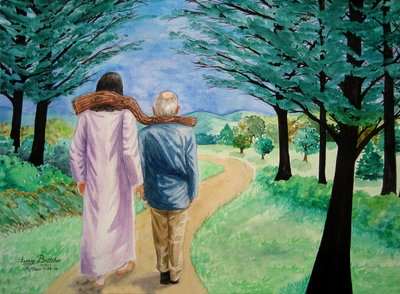Wednesday, July 28

We noticed already that Matthew’s use of “yoke” in this section echoes Judaism’s use of the term and that of other New Testament texts referring to a wrong understanding of the law.
The Greek term translated as “easy” in Matthew 11:30 can also be translated as “good, pleasant, useful, and benevolent.” Many people around us consider God’s law heavy-handed, difficult to comply with, and, at times, irrelevant. How can we help them to discover the beauty of the law and inspire love for the Lawgiver?
Parents always remember the moment when their child took that first step. A wobbly first step is followed by a tentative second step, then a third — and by then it’s most likely that the child will stumble and fall. There may be some tears and perhaps even a bruise, but once the child has felt the freedom of movement, he or she will get up and try again. Walk, fall, get up, walk, fall, get up. The sequence repeats itself many times before the child can walk securely. And yet, amidst stumbles and falls, there is a proud little face triumphantly declaring: Papa, Mama, I can walk!
Walking with Jesus may not always be easy, but it’s always good and the right thing to do. We may stumble; we may even fall; yet, we can get up and continue to walk with Him at our side.
In Galatians 5:1, Paul wrote: “Stand fast therefore in the liberty wherewith Christ hath made us free, and be not entangled again with the yoke of bondage”. What does that mean? How has Christ made us free? What is the difference between the yoke He asks us to carry and the “yoke of bondage” that Paul warns us against?
We can be sure that whatever exactly Paul meant by the “yoke of bondage,” he was not referring to obedience to God’s law, the Ten Commandments. On the contrary, it’s through obedience, by faith, understanding that our salvation is secure, not based on the law but on Christ’s righteousness covering us, that we can have true rest and freedom.
Why is living a life of obedience to God’s law one of more restfulness than one in which we disobey that law?
Thursday, July 29

Jesus’ final statement in Matthew 11:30 uses the imagery of bearing a burden: “For my yoke is easy, and my burden is light”.
Moses was delighted to see his father-in-law Jethro after Israel had left Egypt and crossed the sea. Read Exodus 18:13-22. What does bearing another person’s burden look like in this story?
Exodus 18:13 tells us that people came to Moses for judgments from morning until evening. When Moses’ father-in-law saw this, he earnestly pleaded with his son-in-law to establish a structure that would allow him to focus on the big things while trusting others to take care of the more mundane things. Scripture tells us that Moses listened to Jethro’s voice and implemented these life-giving changes.
When Jesus told us that His burden is light, He wanted to remind us that we can rely on Him, the ultimate Burden Bearer. Like Moses, we must learn that we need others to share our burdens. In 1 Corinthians 12:12-26, Paul’s imagery of the body of Christ offers a good illustration of what shared burdens may look like. We need a functioning body to be able to carry any weight. We need legs, arms, shoulders, muscles, and sinews to carry anything.
Read Galatians 6:2. How does bearing one another’s burdens help us fulfill the law of Christ?
The immediate context of this passage may offer some help. In Galatians 6:1, Paul states that if a brother or sister falls into temptation, we are to restore that person in a spirit of gentleness (remember Jesus’ claim in Matthew 11:29 that He is gentle). Burden bearing means restoring someone who has gone off the track in order to help that person see divine grace. But it also means helping one another when we, or they, suffer hardship. The Greek term for “burden” can refer to a heavy weight or stone. It’s a reminder that we all carry burdens and that we all need those who can help us carry the burden. Burden-sharing is a divinely ordained church activity requiring gentleness and producing compassion.
Think about the last time someone helped you carry a burden that you were struggling under. Why did that mean so much to you? Whose burden can you help carry now?
Friday, July 30

Further Thought: “When you find your work hard, when you complain of difficulties and trials, when you say that you have no strength to withstand temptation, that you cannot overcome impatience, and that the Christian life is uphill work, be sure that you are not bearing the yoke of Christ; you are bearing the yoke of another master.” Ellen G. White, Child Guidance, p. 267
“There is need of constant watchfulness and of earnest, loving devotion, but these will come naturally when the soul is kept by the power of God through faith. We can do nothing, absolutely nothing, to commend ourselves to divine favor. We must not trust at all to ourselves or to our good works; but when as erring, sinful beings we come to Christ, we may find rest in His love. God will accept every one that comes to Him trusting wholly in the merits of a crucified Saviour. Love springs up in the heart. There may be no ecstasy of feeling, but there is an abiding, peaceful trust. Every burden is light; for the yoke which Christ imposes is easy. Duty becomes a delight, and sacrifice a pleasure. The path that before seemed shrouded in darkness becomes bright with beams from the Sun of Righteousness. This is walking in the light as Christ is in the light.” Ellen G. White, Faith and Works, pp. 38, 39
Discussion Questions:
1. Do you remember the moment in your walk with Jesus when you finally surrendered? Share this moment in your class and focus particularly on the reason why you surrendered.
2. Study Jesus’ prayer in Matthew 11:25-27 and discuss in your class how we gain knowledge of grace. Why does God hide the plan of salvation (“these things”) from the wise and prudent and reveal them to babes?
3. In a practical way, how can we, help those around us struggling with their burdens to come to Jesus and find rest?
4. Dwell more on this idea of being “meek and lowly in heart.” Isn’t that bad for a person’s self-esteem? Shouldn’t we feel good about ourselves, especially someone who struggles with self-doubts anyway? How should the cross, and what the cross represents, help us to understand what Jesus means about being “meek and lowly?” That is, in the presence of the cross, why are meekness and lowliness the only real appropriate attitudes to have?